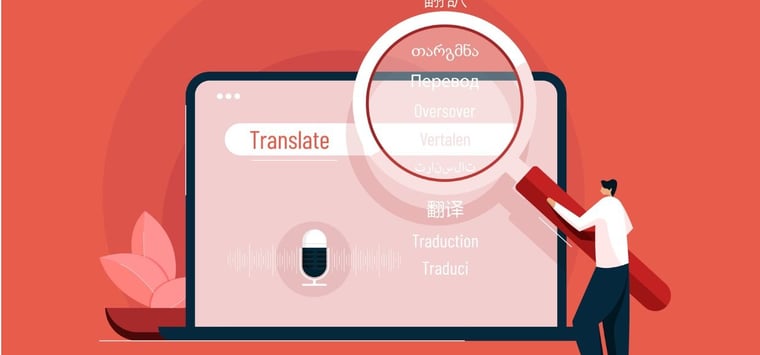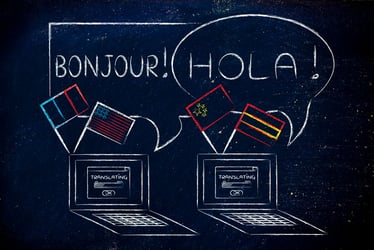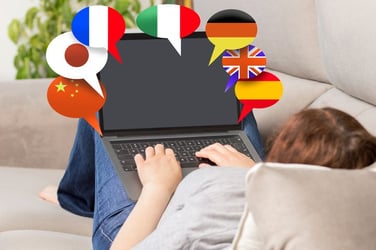Do you need to translate your website or localize it? This is a really interesting question.
But actually, there is only one answer - you need to localize your website.
In reality, you need the services of not just a translator but a Language Service Provider (LSP), so you can properly head into the territories that are ripe for your product or service.
But we’re getting ahead of ourselves. If you’re not in the Language Services industry, localization sounds like a buzzword or industry jargon for translation. Like when garbage men call themselves private waste logistics workers.
In this article, we’ll explain that nothing could be further from the truth. The riches are in the niches, and localization can take you there.
At LinguaLinx, we face this misconception frequently and we also understand, from a potential client’s point of view, why it’s there.
Anyway, let’s clear things up, blow away the smoke, and get to the facts.
What is Localization?
So what exactly is localization?
Imagine you want to impress a client, and you have a little information on them - they’re into their wine. You get a bottle of Pino Grigio as a gift. They get it and are underwhelmed, almost offended. Why? It’s wine, so what’s wrong?
Well, what they really like is a nice mature Bordeaux. So you got “wine” right, but you got the wrong color, the wrong vintage, from the wrong country and showed little care for really understanding them.
You may as well have got your wife carnations from the gas station for your 10th wedding anniversary. I mean, they’re flowers, right?
Localization is a total immersion into, not just a language, but a culture. A community. A subsection of that community. Your target market that your research has led you to. After all, it’s not cheap to move into new markets.
Localization is part of a strategy, not a project.
With Localization, You Still Get the Benefits of Translation
By partnering with an LSP to localize your website, you get the best of both worlds.
You get your website localized into the region you’re entering and you get accredited translators working on it.
Your LSP will have a number of translators to work with and will suggest translators who have experience not just in the right language, but the right culture, and who also have digital experience and a track record translating for your industry.
Have You Considered Localized Website Design?
When we think of translation, we usually think of words - text being taken from one language and converted into another. But what about the design of your website? This needs to be localized as well.
Some languages, such as Arabic, Farsi, and Hebrew are read right to left. Chinese, Japanese, Korean and Vietnamese are read top to bottom in a single column, and right to left, so the first column is on the right side of your webpage.
If you’re heading into a strict Muslim territory, are the men and women in your imagery clothed according to cultural norms?
How do these considerations affect the design of your website and the User Experience (UX)?
Learn more: What is Desktop Publishing and Why is it Important?
How is the Relationship with the Digital Team Going to Work?
Translators aren’t used to having to consider design and UX. LSPs are. An LSP will work with you through the localization of your website. This involves working with your internal digital team, or your digital partner - whoever built and maintains your website.
Having experience in this area is critical, otherwise, a translation might be delivered to the digital team who then won’t be able to use it correctly.
Quality Assurance (QA)
How accurate is the Spanish translation that’s provided to you by the translator? I suppose you have to take their word for it because, after all, you don’t speak Spanish.
And even if it’s 100%, do you intend to use it for all of Spain? If you don’t want to offend your customers in the North East, then you’re probably going to want to use Catalan and not traditional Spanish.
The importance of quality assurance can’t be underestimated. Finding a translator who will willingly hand their translation over to another translator (a competitor) for double-checking is rare.
We highly recommend you localize your website with an LSP who works with a lot of qualified translators. This should be a standard part of the process.
Localization Drives Engagement Through Credibility
This is the bottom line. This is what translation alone can’t do. This is the attention to detail that’s going to get you cut through into that new market you’re entering.
This is what every brand, everywhere in the world, wants - from Coke, VW, and Nike to the little tech start-up operating from the kitchen table:
Credibility.
Localize and you’ll connect with each region, each culture, and each customer, by showing you care about them. You care about them as individuals and you’re customizing your content for them because their way of life is important. Are you really going to connect with all 1.38 billion people in India, who speak 456 languages, using a single translation strategy? It’s very doubtful.
Localization creates a mindset that’s about scaling up businesses to be appealing to new customer groups. Translation is a big part of this, but if you want to grow…localize.
Get a Quote for Your Website Translation Project
As you can tell, there are a lot of factors to consider when choosing the best language service provider to help translate your website.
If you’re thinking of translating your website, we’d love to sit down and talk with you about it.
Consultations are free and there's no obligation.
With LinguaLinx, you won't ever have to worry about your message getting lost as it’s translated into multiple languages across your website. You know you're in good hands with our ISO 17100 and ISO 9001 compliance twenty years of professional translation experience, and the organizations whose trust we've earned.







